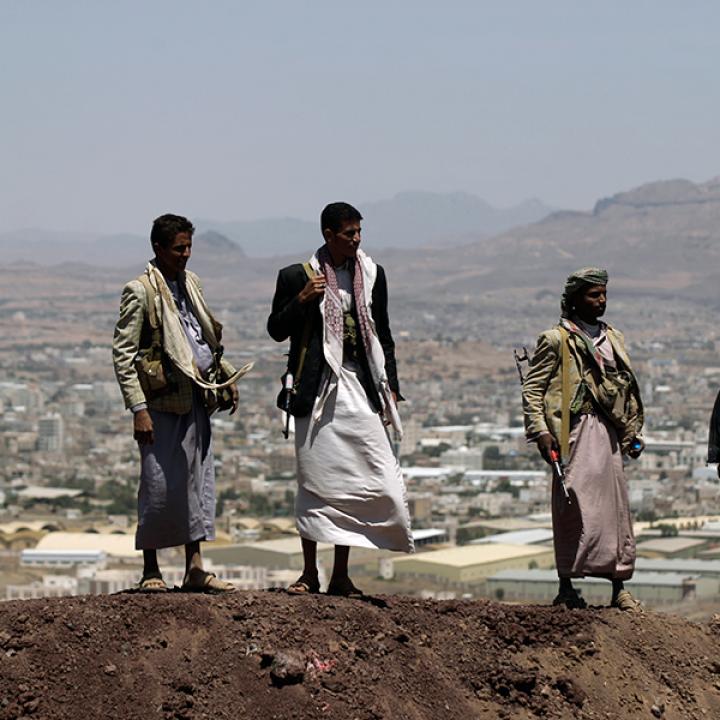

Washington's Gulf partners in the coalition against ISIS are increasingly distracted by the takeover of the Yemeni capital by pro-Iranian Houthi tribesmen.
On October 1, the interior ministers of Saudi Arabia, Kuwait, Bahrain, Qatar, the United Arab Emirates, and Oman, joined by the head of Saudi intelligence, held an "emergency" meeting in the Saudi Red Sea port city of Jeddah to discuss the rapidly deteriorating situation in Yemen, where the government of President Abdu Rabu Mansour Hadi has lost control of the capital, Sana. The Gulf Cooperation Council (GCC) states have been guiding an "initiative" to smooth political reform since the 2012 collapse of the regime of President Ali Abdullah Saleh. An official statement afterward, apart from platitudes like the "necessity to restore all official headquarters and institutions," included the ominous phrase that the GCC states will not idly tolerate "foreign interference," an obvious reference to Iran.
The extent of links between the Houthis, who come from northwestern Yemen, and Iran is unclear, but Houthi fighters are reported to have been trained in Iran and training camp videos show resemblances to Iranian-backed Hezbollah fighters in Lebanon. Religiously, Houthis, estimated to be around one-third of Yemen's population of 26 million, are Zaidi Shiites but have traditionally had closer ties to Yemeni Sunnis than Iranian Shiites. Saudi Arabia, which has its own Zaidi population on its side of the mutual frontier, has always mistrusted Houthis and fought a brief border war with them in 2009-2010, during which Riyadh's forces suffered several embarrassing setbacks.
The latest crisis has evolved in just a few weeks. In late August, armed Houthis, feeling marginalized by the Mansour Hadi government, set up protest camps around the capital, the culmination of a six-month push south from their territory barely noticed by the outside world. Then, a week ago, after four days of fighting around a major military base in the capital's northwest, Houthi gunmen suddenly took over the capital itself, setting up checkpoints across the city. The government was forced to sign an agreement to set up a new administration, but it quickly became a dead letter when the Houthis seized control of the airport, the parliament, the central bank, and the army headquarters. President Mansour Hadi is notionally still the ruler, as the Houthi leadership appears to want a strong hand in a new government but not to rule directly itself.
Washington has watched the evolving crisis closely but apparently powerlessly. President Obama's top counterterrorism aide, Lisa Monaco, visited Sana on September 6, after which the White House said she had "emphasized that the United States will stand firmly behind the Yemeni government in confronting challenges to progress in the peaceful transition process." Four days later, the president telephoned King Abdullah of Saudi Arabia before announcing his strategy to counter the Islamic State of Iraq and al-Sham (ISIS) -- renamed the Islamic State (IS) a few months ago when the group declared a caliphate in parts of Iraq and Syria. The White House readout of the call noted that the two leaders "also discussed developments in Yemen, and reiterated their shared commitment to support President Hadi and the Yemeni government in achieving a sustainable resolution to current tensions with the Houthi movement within the framework of the GCC initiative transition process." In his televised address later that day, President Obama credited Yemen as being a successful example of U.S. counterterrorism strategy. But a week later, the U.S. embassy in Sana, citing a high security threat level due to terrorist activities and civil unrest, urged U.S. citizens in Yemen to leave the country.
The Yemen crisis is a reminder that Saudi Arabia and other conservative Gulf states regard Iran's capacity for mischief to be just as troubling as the advance of ISIS in Syria and Iraq. Although Iran's hand in Yemen is unclear -- and speculation suggests that the Houthis are also being supported by former president Saleh -- perception is its own reality for GCC leaders. Now, the great challenge will be for the GCC and the United States to assist President Mansour Hadi in reestablishing control.
The complicating elements are many, including the fact that the president's military commander, Maj. Gen. Ali Mohsen al-Ahmar, is in hiding, hunted by Houthis; the implications for U.S. counterterrorism of the numerous al-Qaeda in the Arabian Peninsula elements hiding in Yemen, with AQAP proving to be a notably resilient al-Qaeda affiliate; and the possible impact of events on GCC military participation in coalition attacks on ISIS. Yet another complication is posed by talk of a possible compromise deal with Iran on the nuclear issue, which would likely upset Saudi Arabia given its visceral distrust of Iran. All such circumstances call for enhanced diplomatic efforts by Washington in GCC capitals in order to prevent these important members of the anti-ISIS coalition from distancing themselves from the United States at a critical moment.
Simon Henderson is the Baker Fellow and director of the Gulf and Energy Policy Program at The Washington Institute.



